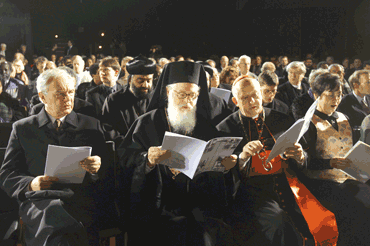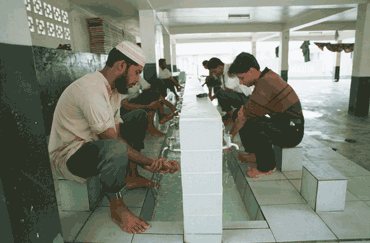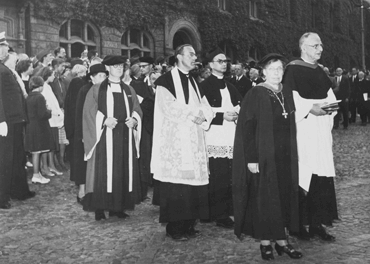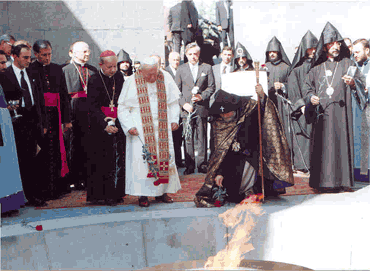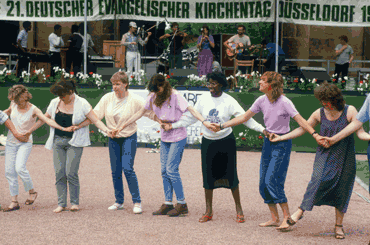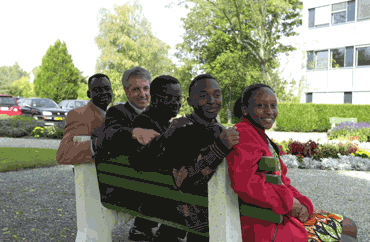
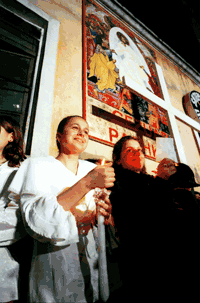 The resurrection was celebrated in an Easter liturgy at the Church of the Annunciation, Tirana, Albania (WCC/Peter Williams) "One of the most significant affirmations of the commission was that consensus is the appropriate decision-making method for WCC governing bodies. This process intends to ensure that all strongly held positions will be incorporated in the report or in the process of the meeting as a whole, thus contributing to a spirit of common work towards unity in the conduct of business in the Council... Therefore consensus procedures allow any group of churches, through a spokesperson, to have their objections to any proposal addressed and satisfied prior to the adoption of the proposal, or on rare occasions for any group of churches to stop any proposal until they are satisfied that their concerns have been fully addressed." Communiqué from third plenary meeting of the Special Commission, Hungary, 5-10 November 2001 Press release "Worshipping together... with fellow believers of Bangladesh and the fellowship, affection and sense of togetherness experienced irrespective of cultural or language barriers are our common bond of unity in Christ and a mark of living letters written with love." Konrad Raiser during March 2001 visit to Bangladesh churches Press release "We must admit that Christianity historically has been a proselytizing faith, trying to make converts of 'heathens'. We now have a deeper understanding of other religions, but we have an inner ambiguity: on the one hand proclaiming the uniqueness of Christ and, on the other, wishing for a true dialogue." Konrad Raiser on March 2001 pastoral visit to Sri Lanka Press release "How to move forward? Interestingly, by gaining experience - experience at the local level of each other's church life, worship, even church administrations. The churches hope that seeing each other 'from inside' will help them understand each other's 'faithfulness' and lead to new dimensions of common life." Thomas F. Best commenting on bilateral dialogues on church union, after attending a Church of England/Evangelical Church in Germany meeting in May 2001 "The WCC has been known to substitute social activity for evangelism while rejecting the authority of holy scripture and compromising cardinal teachings regarding the deity of Christ, the universality of sin, and sexual orientation." Pentecostal perception of the WCC (a sample) "Do Pentecostals question the legitimacy of other Christian traditions since they practise re-baptizing of converts?" WCC question about Pentecostals (a sample) Both from a report by Huibert van Beek on the second meeting of the WCC-Pentecostal consultative group in Quito, end August 2001 "In a time of globalization, with increasing violence, fragmentation and exclusion, the mission of the church is to receive, celebrate, proclaim and work for the fullness of life in Christ." |
YEARBOOK 2002: ECUMENICAL FELLOWSHIP The Special Commission responding to concerns of the Orthodox churches in regard to participating churches' relationships with the World Council of Churches (WCC) met in Berekfürdo, Hungary, 14-21 November 2001. Konrad Raiser, WCC general secretary, said afterwards that the commission had reached a conclusion and was preparing a recommendation on one of the primary points at issue. This involved acceptance of the Orthodox request to move the WCC to a process of acting by consensus rather than decision-making along the lines of majority votes in the parliamentary fashion. There is "nothing specifically Christian or specifically democratic" about parliamentary majorities, Raiser adds. He also reported that the commission had moved most of the way to settlement of the questions of membership and representation that were on their agenda, as well as conducting extensive discussions on common prayer at ecumenical gatherings. Further deliberations were scheduled for the following year, with a report and recommendations due to be presented at the WCC central committee meeting in August and September 2002.
Questions regarding membership and representation on governing structures of the WCC extended beyond specifically Orthodox concerns, and a separate committee was set up to study broad questions of membership. In June 2001, two documents adopted by the Russian Orthodox Church in 2000 were the subject of talks between its leaders and representatives of the WCC and the Conference of European Churches (CEC). One of the documents dealt with the Russian Orthodox stance towards other churches, the second on its approach to social issues. In July, Raiser visited the Orthodox Autocephalous Church of Albania. He also participated in ceremonies marking the 1700th anniversary of Armenian Christianity with visits in May to the Catholicosate of Cilicia in Antelias, Lebanon, and in September to the Holy See of Etchmiadzin, Armenia. Throughout the year, Raiser sought to strengthen global ties through visits to WCC member churches in Bangladesh and Sri Lanka as well as South Asia and the Pacific. In order to develop ecumenical solidarity in Congo, the WCC brought representatives of its member churches and ecumenical partners from that nation to a meeting in Geneva.
Faith and Order Faith and Order activity in 2001 included work on an ongoing study of "The Nature and Purpose of the Church". Alan Falconer, team coordinator for Faith and Order, highlighted the importance of this study by the Faith and Order commission as the first attempt at giving expression to what the churches can say together about the nature and purpose of the church. The process involves many younger theologians. More than 30 responses to a 1998 text have been received, and work on redrafting it was undertaken at meetings in Ottawa, Canada, in June and London, England, in December. Falconer cited another key event in 2001, a May meeting of the eighth bilateral forum of communions in one-on-one dialogue and cooperation. The forum was held in Annecy, France, organized on behalf of the general secretaries of Christian world communions. There, Falconer said, participants were able to reflect on the importance of interchurch regional agreements which are expressions of changed relationships having occurred as a result of various theological dialogues. The widespread acceptance of the 1982 ecumenical statement on Baptism, Eucharist and Ministry has been of particular significance in providing a framework for these new bilateral church relationships.
In 2001, the Faith and Order commission did preparatory work for a 2002 commemoration in Lausanne, Switzerland, of the 75th anniversary of the first world conference on Faith and Order, held at Lausanne in 1927, and prepared for the 50th anniversary of the third world conference in Lund, Sweden. Expanding relationships The WCC employed various channels to advance its ecumenical agenda in 2001. In May, the Joint Working Group between the WCC and the Roman Catholic Church met in Northern Ireland and in that context increased its awareness of the urgency and character of ecumenical dialogue, seeing for themselves the importance of ecumenical reconciliation for furthering such dialogue as well as fostering commitment to journey together.
A committee working on a proposal to establish a forum that would bring together WCC churches with the Roman Catholic, Pentecostal and Evangelical churches met in December and planned a June 2002 meeting for some 60-70 representatives of these groups at Fuller Theological Seminary in California, USA. The second meeting of a WCC-Pentecostal consultative group was held at a Pentecostal seminary 27 August-1 September near Quito, Ecuador, with participants addressing the question: How do we perceive each other? Ecumenical leadership In June, for the first time, the WCC arranged a seminar in the Ecumenical Institute at Bossey, Switzerland, to assist women in roles of ecumenical leadership. Some two dozen women participated.
Simon Oxley of the WCC's staff team for Education and Ecumenical Formation reported that as a contribution to the Decade to Overcome Violence, a conference on peace education was also held in June in Belfast, North Ireland. In addition to engaging in the events in Belfast and Bossey, the team conducted a study of global partnerships between congregations which developed a process by which to learn from their experiences. A similar theme emerged from a Cyprus consultation of religious educators in November; they considered how religious education can promote good community relations. Late in the year, an ecumenical leadership training seminar for young people was convened in Cuba. Over a period of three weeks, students produced projects for their own churches dealing with such problems as violence, economic globalization, HIV/AIDS, gender inequities, and needs for religious dialogue, mission and peace. A follow-up seminar is planned in 2003 with the hope that the students' experiences in their churches may provide material for an ecumenical leadership training manual and supporting videotapes. During 2001, the Ecumenical Institute of Bossey expanded on its tradition of ecumenical formation through enlarged and more intensive academic programmes: two graduate schools were offered as well as the course leading to the degree of master in ecumenics granted in cooperation with the autonomous faculty of Protestant theology at the University of Geneva. The particular vocation of Bossey as a "laboratory of the ecumenical movement" was strengthened during 2001 through a number of seminars, opened to a larger audience and in particular to laity and non-professional theologians, addressing sensitive topics facing churches today. At the same time, Bossey intentionally opened itself to students coming from churches and Christian communities which are not members of the WCC. A number of Protestant evangelicals and Pentecostals attended Bossey's programmes in 2001. Meanwhile, the physical facilities at Bossey continued to be upgraded. In September 2001, Ioan Sauca, a priest of the Orthodox Church of Romania, was engaged as the new director of the Ecumenical Institute. Mission and evangelism At the end of August and beginning of September, the WCC's Commission on World Mission and Evangelism met in Chicago, USA, and began planning for a world mission conference to be held within the next five years. "Called in Christ to be reconciling and healing communities" was chosen as the main theme for the conference. Like the last such conference, held in Brazil in 1996, it is expected that about 500 representatives will participate, plus staff, press, stewards and visitors. Roman Catholics and some Protestant evangelical organizations are full members of the commission, and plans were made to invite representatives of other groups involved in mission work but without formal status as commission members. This conference was one of the subjects of discussion when the staff team for Mission and Evangelism visited Rome for talks with the Pontifical Council for Promoting Christian Unity and with other Roman Catholic units and officials. Carlos Ham of Cuba joined the WCC team for Mission and Evangelism in March 2001, and by year's end he had organized a school of evangelism in Cuba for people related to the Caribbean Council of Churches. Jacques Matthey, coordinator of the WCC team for Mission and Evangelism, says the school served as an eye-opener for some who had imagined that the WCC lacked interest in evangelism. The WCC believes "it is important that a clear message about Jesus Christ is being shared, but the message must be embedded in the common life", said Matthey. The WCC's newsletter on evangelism reappeared in 2001 after a year-long lapse in publication. Also in March, a group of specialists in mission study gathered to prepare for a consultation on missiology in 2002. The consultation will deal with the theme of "changing identities in a plural world". Communication and media In September, the WCC Public Information team sponsored five journalists from African media organizations who came to Geneva in order to provide coverage of WCC and UN work on refugees and uprooted people in the context of the WCC's focus on Africa. It was hoped that African journalists engaged in this programme might gain insights into international communication networks covering the life of Africa.
Altogether, thirty WCC partners from diverse regions attended the September meeting in Geneva of the WCC Global Ecumenical Network on Uprooted People, followed by participation in the UN High Commissioner for Refugees' annual consultation with non-governmental organizations (NGOs), the global consultations on international protection and the UNHCR executive committee. The presence of so many representatives in these fora enhanced the churches' visibility and effectiveness in these circles. |
